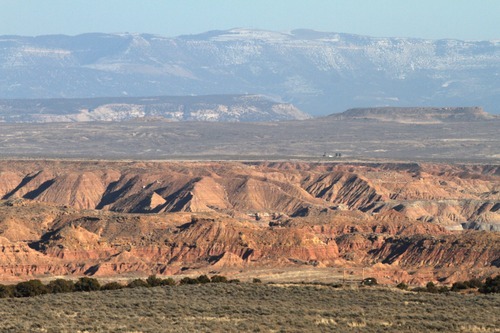This is an archived article that was published on sltrib.com in 2012, and information in the article may be outdated. It is provided only for personal research purposes and may not be reprinted.
A Utah judge is hearing testimony in an environmental appeal that seeks to block what could become the nation's first commercial mine producing oil from asphalt-like tar sands.Living Rivers, a Moab-based group, appealed the state's permit for a proposed tar-sands mine because, it argues, the company and regulators ignored threats to groundwater, seeps and springs in the Book Cliffs of eastern Utah.Arguing the appeal before state Administrative Law Judge Sandra Allen on Wednesday, attorneys for the state and the company said there's not enough water there to monitor or require a pollution permit.US Oil Sands, the Canadian mining company formerly known as Earth Energy Resources, hired well drillers to punch 108 holes into the PR Spring area to see if the state land under lease contained any groundwater."There were no signs of groundwater, so they didn't note them in their [drilling] logs," said Chris Hogle, an attorney representing the company. "That is irrefutable evidence of lack of water."Living Rivers, which appealed the permit issued last year by the Division of Water Quality, contends that groundwater exists at least intermittently in the arid hills of eastern Utah. It's what feeds seeps and springs throughout the area, said Rob Dubuc, a Western Resource Advocates attorney representing the group.Poisoning those springs with hydrocarbons could threaten deer, elk and bighorn sheep herds that the state and conservation partners have spent millions of dollars to build in the remote area, he said."Today the Book Cliffs area is considered one of the greatest big-game hunting areas in the world," Dubuc said.At issue in the appeal is whether DWQ erred in granting the mine a "permit by rule," a technical classification that requires less review than if the company had been required to apply for a permit to discharge water pollution. State officials said they did so because of the apparent lack of groundwater at the site, leading them to believe there was little potential for pollution.Dubuc argued that the state didn't press the company to prove there's never any water in the ground, and ignored state law that he said requires protection of all state waters of any quantity.Robert Herbert, groundwater protection program manager for the division, initially said he believed water must exist in "usable" quantities to be regulated. Later, though, he agreed with Dubuc's assertion that such a distinction does not exist in the law, and that he could not define a usable quantity.The appeal rests partly on a University of Utah geochemist's testimony that the citrus-based solvent that the company plans to use to strip oil from the sands will leave tailings more mobile, and therefore more likely to pollute water. Hogle said there's not likely to be much tar left to leach, though, because the company's process is designed to "squeeze every last drop of bitumen that they can from the sands."The hearing room was closed to the public but video of the proceedings was shown in a conference room where about a dozen people gathered to watch. The group Utah Tar Sands Resistance handed out form letters for people to use in protesting the hearing closure. bloomis@sltrib.com —
If you go
P The tar-sands mine water appeal hearing continues:
When • 10 a.m.-5 p.m. Thursday.
Where • Department of Environmental Quality, 195 N. 1950 West, Salt Lake City.
Notes • There will be live video viewing in the Four Corners Conference Room. A ruling is expected at a later date.



